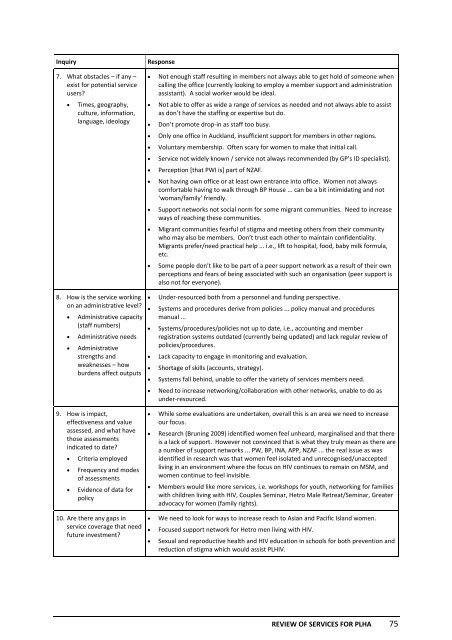Review of services for people living with HIV in New Zealand
Review of services for people living with HIV in New Zealand
Review of services for people living with HIV in New Zealand
- No tags were found...
You also want an ePaper? Increase the reach of your titles
YUMPU automatically turns print PDFs into web optimized ePapers that Google loves.
InquiryResponse7. What obstacles – if any –exist <strong>for</strong> potential serviceusers?Times, geography,culture, <strong>in</strong><strong>for</strong>mation,language, ideology8. How is the service work<strong>in</strong>gon an adm<strong>in</strong>istrative level?Adm<strong>in</strong>istrative capacity(staff numbers)Adm<strong>in</strong>istrative needsAdm<strong>in</strong>istrativestrengths andweaknesses – howburdens affect outputs9. How is impact,effectiveness and valueassessed, and what havethose assessments<strong>in</strong>dicated to date? Criteria employed Frequency and modes<strong>of</strong> assessments Evidence <strong>of</strong> data <strong>for</strong>policy10. Are there any gaps <strong>in</strong>service coverage that needfuture <strong>in</strong>vestment?Not enough staff result<strong>in</strong>g <strong>in</strong> members not always able to get hold <strong>of</strong> someone whencall<strong>in</strong>g the <strong>of</strong>fice (currently look<strong>in</strong>g to employ a member support and adm<strong>in</strong>istrationassistant). A social worker would be ideal.Not able to <strong>of</strong>fer as wide a range <strong>of</strong> <strong>services</strong> as needed and not always able to assistas don’t have the staff<strong>in</strong>g or expertise but do.Don’t promote drop‐<strong>in</strong> as staff too busy.Only one <strong>of</strong>fice <strong>in</strong> Auckland, <strong>in</strong>sufficient support <strong>for</strong> members <strong>in</strong> other regions.Voluntary membership. Often scary <strong>for</strong> women to make that <strong>in</strong>itial call.Service not widely known / service not always recommended (by GP’s ID specialist).Perception [that PWI is] part <strong>of</strong> NZAF.Not hav<strong>in</strong>g own <strong>of</strong>fice or at least own entrance <strong>in</strong>to <strong>of</strong>fice. Women not alwayscom<strong>for</strong>table hav<strong>in</strong>g to walk through BP House ... can be a bit <strong>in</strong>timidat<strong>in</strong>g and not‘woman/family’ friendly.Support networks not social norm <strong>for</strong> some migrant communities. Need to <strong>in</strong>creaseways <strong>of</strong> reach<strong>in</strong>g these communities.Migrant communities fearful <strong>of</strong> stigma and meet<strong>in</strong>g others from their communitywho may also be members. Don’t trust each other to ma<strong>in</strong>ta<strong>in</strong> confidentiality.Migrants prefer/need practical help ... i.e., lift to hospital, food, baby milk <strong>for</strong>mula,etc.Some <strong>people</strong> don’t like to be part <strong>of</strong> a peer support network as a result <strong>of</strong> their ownperceptions and fears <strong>of</strong> be<strong>in</strong>g associated <strong>with</strong> such an organisation (peer support isalso not <strong>for</strong> everyone).Under‐resourced both from a personnel and fund<strong>in</strong>g perspective.Systems and procedures derive from policies ... policy manual and proceduresmanual ...Systems/procedures/policies not up to date, i.e., account<strong>in</strong>g and memberregistration systems outdated (currently be<strong>in</strong>g updated) and lack regular review <strong>of</strong>policies/procedures.Lack capacity to engage <strong>in</strong> monitor<strong>in</strong>g and evaluation.Shortage <strong>of</strong> skills (accounts, strategy).Systems fall beh<strong>in</strong>d, unable to <strong>of</strong>fer the variety <strong>of</strong> <strong>services</strong> members need.Need to <strong>in</strong>crease network<strong>in</strong>g/collaboration <strong>with</strong> other networks, unable to do asunder‐resourced.While some evaluations are undertaken, overall this is an area we need to <strong>in</strong>creaseour focus.Research (Brun<strong>in</strong>g 2009) identified women feel unheard, marg<strong>in</strong>alised and that thereis a lack <strong>of</strong> support. However not conv<strong>in</strong>ced that is what they truly mean as there area number <strong>of</strong> support networks ... PW, BP, INA, APP, NZAF ... the real issue as wasidentified <strong>in</strong> research was that women feel isolated and unrecognised/unaccepted<strong>liv<strong>in</strong>g</strong> <strong>in</strong> an environment where the focus on <strong>HIV</strong> cont<strong>in</strong>ues to rema<strong>in</strong> on MSM, andwomen cont<strong>in</strong>ue to feel <strong>in</strong>visible.Members would like more <strong>services</strong>, i.e. workshops <strong>for</strong> youth, network<strong>in</strong>g <strong>for</strong> families<strong>with</strong> children <strong>liv<strong>in</strong>g</strong> <strong>with</strong> <strong>HIV</strong>, Couples Sem<strong>in</strong>ar, Hetro Male Retreat/Sem<strong>in</strong>ar, Greateradvocacy <strong>for</strong> women (family rights).We need to look <strong>for</strong> ways to <strong>in</strong>crease reach to Asian and Pacific Island women.Focused support network <strong>for</strong> Hetro men <strong>liv<strong>in</strong>g</strong> <strong>with</strong> <strong>HIV</strong>.Sexual and reproductive health and <strong>HIV</strong> education <strong>in</strong> schools <strong>for</strong> both prevention andreduction <strong>of</strong> stigma which would assist PL<strong>HIV</strong>.REVIEW OF SERVICES FOR PLHA 75
















